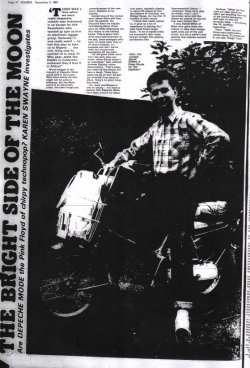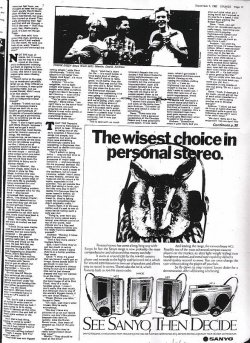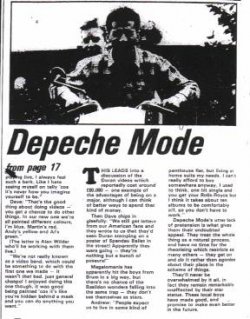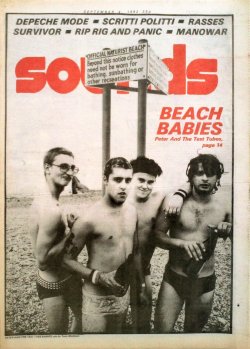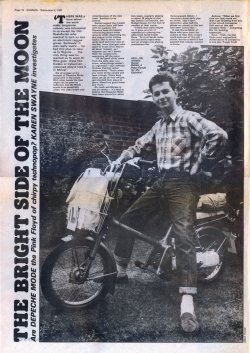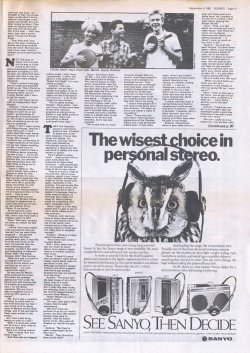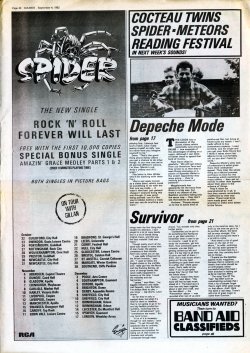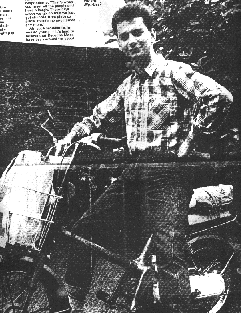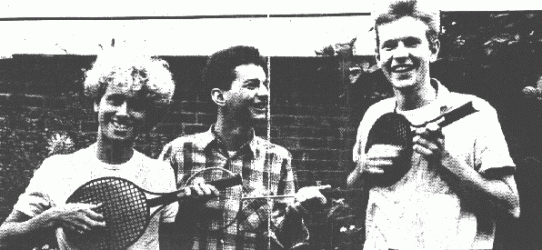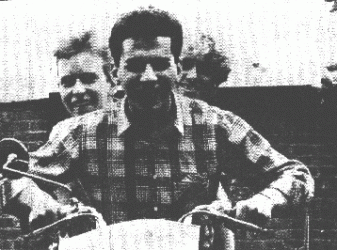You are using an out of date browser. It may not display this or other websites correctly.
You should upgrade or use an alternative browser.
You should upgrade or use an alternative browser.
Depeche Mode The Bright Side Of The Moon (Sounds, 1982)
- Thread starter demoderus
- Start date
THE BRIGHT SIDE OF THE MOONRelaxed interview with the band, who sound understandably tired after a round of similar interviews, from the angle of how fame and fortune seems to have suddenly grabbed them after months of playing the Bridgehouse. Generally there's little new stuff here, going over the familiar ground of how they got their lucky break. That said, it's a serviceable article and a very pleasant read.
" They honestly are the archetypal boys-next-door, open and straight-forward and often bemused by all the fuss. They tell me that a lot of people expect them to be out clubbing all the time, but that they find it too tiring. "
“There was a time when we were really desperate, nobody was interested in us except for this Rastafarian who wanted to turn us into an electronic reggae group. Seriously! It was really weird – he had this plan to take us to Nigeria… the only thing was he wanted us to wear Dr Who gear, dress like Daleks or Cybermen – reckoned they’d love it in Africa!”
We all snigger at the thought of Depeche Mode going wild in the jungle. With other bands the idea might not be quite so ludicrous, but the Mode sound is so essentially urban, the clean bright pop consciousness of the new town, Basildon to be precise.
Seated around the modest semi where Dave still lives with his parents, the Depeche boys are happily reminiscing about times gone by while dispensing tea and charm to the visiting hacks. This is about their ninth (and last) interview of the day, more strangers who want to know what they’re all about (maaan), so I suppose you can’t blame them for occasionally wandering off the point.
“All the good times came from the early days you know, when things weren’t so organised,” says redhead Andrew Fletcher rather despondently. “That’s when you meet all the people and have a laugh. These days when we go on tour we just get shunted from place to place, there’s no good times any more.”
Ah, such worldliness in one so young – it’s hard to believe that Depeche Mode have been around for about two years, regularly playing to about 20 people at the last bastion of futurism, the Bridge House, for the first 12 months of their career.
“I think that really helped us, it gave us a lot of experience in playing live,” adds fresh-faced singer Dave. “A lot of bands today are successful right away and go straight into playing somewhere like Hammersmith Odeon. I remember those early gigs so vividly, now I can’t remember what half the places we played on the last tour even looked like.”
It was Daniel Miller of Mute who gave them the chance to take their snappy synth style out of the pub circuit, but for a while it had seemed that nobody wanted to know.
Andrew: “When we first took our tape round we didn’t get anything from any of the record companies. Stiff sent us this real sarcastic letter – something like ‘Hi, budding superstars…’”
Dave: “Yeah, me and Vince went everywhere, visited about 12 companies in one day. Rough Trade were our last hope, we thought at least we’ve got them, surely they’ll like it, after all they’ve got some pretty bad bands, but even they turned us down! They were all tapping their feet and that and we thought – this is the one! – then they went, hey, that’s pretty good, it’s just not Rough Trade.
“Then they said, how about this man, pointing at Daniel who’d just walked into the room. He took one look at us, went ‘Yeech!’, walked out and slammed the door!”
Not the best of starts, but it turned out he was in a bad mood at the time, and a subsequent meeting led them to signing to him. By then the tables had been turned, this time it was the majors who were chasing the band.
“They’d come to the gigs, buy us meals and generally fatten us up. They offered us loads of money, it was quite tempting really, but we trusted Daniel, didn’t want to let him down.”
Do you ever regret going with an independent label though?
Andrew: “I think we lose out a bit because there’s things we can’t do as we haven’t got hundreds of thousands of pounds behind us. We’ve got a partnership deal, so anything we do we pay for ourselves.”
Dave: “I don’t regret going with Mute though, because I think we’ve got a much better deal than most bands, we’re far more in control of things. We manage ourselves too, so we have to budget carefully all of the time, but we can release anything we like. I think a lot of companies would’ve been a bit dubious about releasing the new single – we’ve got other songs which are more obvious hits, but whether they would have been the right thing to bring out is another matter.”
‘Leave In Silence’, the current single, does mark a change in style for Dep Mode. It shows the way their sound is maturing, the rather harsh, brittle edge of their early 45s is gradually being smoothed out and there’s more obvious emotion and feeling evident. It’s an important time for the band – they’ve just completed their second album, ‘The Broken Frame’ [sic], and they’re determined to prove that they can do just as well without Vince Clarke, if not better.
As he was the writer responsible for all their early hits, there must have been a problem when he left?
Dave: “Not really, because we were so rushed we had to cope.
“I think Vince was maybe a bit surprised at how we reacted, but we were fairly prepared – the general atmosphere had been getting really bad, it was like us three and Vince on his own. He just felt that we were becoming public property, he didn’t like what was happening to Depeche Mode, didn’t like being famous, didn’t like touring.
“Now he’s had a couple of hit singles with Yazoo, they’ve got an album out and they go on tour in September – it’s a bit hypocritical really.”
On the new LP Martin Gore wrote all the songs. He’s been the quietest, gazing out from under his blond curls and looking like he’d rather be somewhere else. I try the direct approach. Did you find it easy to suddenly have to write an LP’s worth of tracks?
“No, but it was a question of trying to write them in the little time that we had. I was trying to fit in doing them between all the other things, and in the end half of them were written in the studio.”
Isn’t that a bad thing, having to write to order?
“Well, I’d obviously rather not do it but I think they’ve turned out alright.”
Were you writing before?
“Yeah, I wrote ‘See You’ when I was 17.”
“And that was our biggest selling single,” adds Dave conclusively. “I think this album’s a lot better than ‘Speak And Spell’, it’s more varied anyway.”
Andrew: “It’s a lot weightier, not so lightweight and poppy. A lot of people who liked us before might not like it because it isn’t bouncy – a lot of the songs are very moody.”
“You’ve gotta change though,” Dave states, “you can’t carry on the same level all the time, you just progress as you go along. Before it was more aimed at electropop disco, but everything is dance-orientated these days.”
Last edited:
That the Depeche sound is maturing is good to hear. I’ll admit to being one of the early sceptics, I found their songs to simple, too repetitive, but even then there was something infuriatingly catchy and appealing, a directness that was hard to dislike and even harder to ignore.
They’ll admit to being lucky – they’ve had time to grow away from the pressures of major label concerns – and surprisingly (to me anyway) bemoan the state of the current charts.
“They’re in such a mess at the moment, full of cover versions, which I don’t think is very healthy. Anyone can make an old hit record a hit again, especially in the summer. You get people like Soft Cell doing a cover, but the kids who buy it don’t realise it is because they’ve never heard it before, so although they might not mean to, they’re taking credit for something they didn’t originally make.”
Dave’s right, it is the easy option and it’s sad to see so many bands taking such a safe way out.
“Thing is, over here you have to worry about every record, one minute you’re on top of the world, next minute you’re a flop and nobody wants to know you. It’s really hard to establish yourself.”
Andrew: “Reckon it takes about five albums.”
“And a few more ulcers,” mutters Martin.
Still, I don’t think they’ve got too much to worry about, from where I stand they’re in a better position than most.
Dave: “I think it’s good that we haven’t really got an image. Some bands seem to get stuck in one, but although everyone’s always trying to put us in a pigeon hole we’ve just dressed the way we wanted to at the time.”
Andrew: “The band with the best image of all is Pink Floyd, they’re a really faceless group. I mean I don’t really like their music, but although they’re one of the world’s biggest bands if you saw Brian Waters…”
“Roger Waters you idiot,” bursts in Dave.
“Oh yeah, well that’s what I mean, they’re really anonymous.
“We don’t have any pictures of us on our record covers, because they date so quickly. Like the Duran Duran cover, they were all dressed up, had all the gear on.”
Andrew: “Bet they’re really embarrassed about that now!”
Martin: “They should’ve been at the time!”
Dave: “And that’s there for life – it’s much better to have some kind of design. The new LP sleeve is really good, much better than the last one, that was awful! The guy who did it, Brian Griffin (he also does the Echo and the Bunnymen sleeves), when he was explaining it he was going – I imagine a swan floating in the air – and we’re going, yeah, right, then he’s talking about it floating on this sea of glass and it sounded really great. It turned out to be a stuffed swan in a plastic bag! It was meant to be all nice and romantic, but it was just comical!”
This is said with so much innocent despair that any doubts I had about Depeche being techno-poseurs are banished forever. They honestly are the archetypal boys-next-door, open and straight-forward and often bemused by all the fuss. They tell me that a lot of people expect them to be out clubbing all the time, but that they find it too tiring.
“I dunno how people do it and work at the same time,” says Andrew. “I’d rather go home and watch a video or something.”
Dave: “There was this time when I did a personal appearance at the Camden Palace and I was practically pulled apart. It was really scary, when I got inside I was trapped and there were people clawing at me, ripping my clothes, pulling my hair – I was so frightened I ran and hid myself in the loo, I just didn’t want to come out. I think that was one of my worst experiences, those kids could kill you.”
It seems odd that such a normal bloke (and that’s a compliment) could arouse that kind of hysteria – such is showbiz, I suppose. He’s a fairly reluctant teen hero, buying girls Mars bars when he goes to the shops!
Andrew: “Sometimes when it gets really bad you stop and think what am I doing here? All I wanted to do was be in a band, I was quite happy playing the Bridge House!”
Dave: “Yeah, you sell about ten records and you’re really happy, next thing you know you’re playing Hammersmith Odeon and selling thousands – it doesn’t mean as much as you think it will.”
Andrew: “Up until the band formed, I’d never flown before. When I was younger it was always a dream of mine, but in the last six months I’ve flown so much I don’t even think about it now. Like we used to get really excited about taking off, fight for the window seat, now half the time you don’t even notice when you do take off – it’s bad when it starts getting like that.”
Did you enjoy your last tour?
“When you look back you think you did, but I remember in the middle of the tour going, ‘Oh no, I can’t go on!’”
Dave: “Yeah, it does get a bit much, you all get on top of each other crowded in a little van – we’re doing another one in October though!”
Andrew: “I think we just do it out of habit! Also we developed quite a good live following so we don’t want to let them down.”
“We don’t really do it for enjoyment ‘cos we don’t like playing live, I always feel such a berk. Like I hate seeing myself on telly ‘cos it’s never how you imagine yourself to be.”
Dave: “That’s the good thing about doing videos – you get a chance to do other things. In our new one we’re all painted different colours, I’m blue, Martin’s red, Andy’s yellow and Al’s green.”
(The latter is Alan Wilder who’ll be working with them live.)
“We’re not really known as a video band, which could be something to do with the first one we made – it wasn’t that bad, just general cheapo! I enjoyed doing this one though, it was good being painted ‘cos it’s like you’re hidden behind a mask and you can do anything you want.”
This leads into a discussion of the Duran videos which reportedly cost around £80,000 – one example of the advantages of being on a major, although I can think of better ways to spend that kind of money.
Then Dave chips in gleefully: “We still get letters from our American fans and they wrote to us that they’d seen Duran stamping on a poster of Spandau Ballet in the street! Apparently they were going – they’re nothing but a bunch of poseurs!”
Megalomania has apparently hit the boys from Brum in a big way, but there’s no chance of the Basildon wonders falling into the same trap – they don’t see themselves as stars.
Andrew: “People expect us to live in some kind of penthouse flat, but living at home suits my needs. I can’t really afford to buy somewhere anyway, I used to think, one hit single and you get your Rolls-Royce but I think it takes about ten albums to be comfortably off, so you don’t have to work.”
Depeche Mode’s utter lack of pretension is what gives them their undoubted appeal. They treat the whole thing as a natural process, and have no time for the theorising which restricts so many others – they get on and do it rather than agonise about their place in the scheme of things.
They’ll never be overwhelmed by it all, in fact they remain remarkably unaffected by their star status. These local boys have made good, and promise to make even better in the future.
They’ll admit to being lucky – they’ve had time to grow away from the pressures of major label concerns – and surprisingly (to me anyway) bemoan the state of the current charts.
“They’re in such a mess at the moment, full of cover versions, which I don’t think is very healthy. Anyone can make an old hit record a hit again, especially in the summer. You get people like Soft Cell doing a cover, but the kids who buy it don’t realise it is because they’ve never heard it before, so although they might not mean to, they’re taking credit for something they didn’t originally make.”
Dave’s right, it is the easy option and it’s sad to see so many bands taking such a safe way out.
“Thing is, over here you have to worry about every record, one minute you’re on top of the world, next minute you’re a flop and nobody wants to know you. It’s really hard to establish yourself.”
Andrew: “Reckon it takes about five albums.”
“And a few more ulcers,” mutters Martin.
Still, I don’t think they’ve got too much to worry about, from where I stand they’re in a better position than most.
Dave: “I think it’s good that we haven’t really got an image. Some bands seem to get stuck in one, but although everyone’s always trying to put us in a pigeon hole we’ve just dressed the way we wanted to at the time.”
Andrew: “The band with the best image of all is Pink Floyd, they’re a really faceless group. I mean I don’t really like their music, but although they’re one of the world’s biggest bands if you saw Brian Waters…”
“Roger Waters you idiot,” bursts in Dave.
“Oh yeah, well that’s what I mean, they’re really anonymous.
“We don’t have any pictures of us on our record covers, because they date so quickly. Like the Duran Duran cover, they were all dressed up, had all the gear on.”
Andrew: “Bet they’re really embarrassed about that now!”
Martin: “They should’ve been at the time!”
Dave: “And that’s there for life – it’s much better to have some kind of design. The new LP sleeve is really good, much better than the last one, that was awful! The guy who did it, Brian Griffin (he also does the Echo and the Bunnymen sleeves), when he was explaining it he was going – I imagine a swan floating in the air – and we’re going, yeah, right, then he’s talking about it floating on this sea of glass and it sounded really great. It turned out to be a stuffed swan in a plastic bag! It was meant to be all nice and romantic, but it was just comical!”
This is said with so much innocent despair that any doubts I had about Depeche being techno-poseurs are banished forever. They honestly are the archetypal boys-next-door, open and straight-forward and often bemused by all the fuss. They tell me that a lot of people expect them to be out clubbing all the time, but that they find it too tiring.
“I dunno how people do it and work at the same time,” says Andrew. “I’d rather go home and watch a video or something.”
Dave: “There was this time when I did a personal appearance at the Camden Palace and I was practically pulled apart. It was really scary, when I got inside I was trapped and there were people clawing at me, ripping my clothes, pulling my hair – I was so frightened I ran and hid myself in the loo, I just didn’t want to come out. I think that was one of my worst experiences, those kids could kill you.”
It seems odd that such a normal bloke (and that’s a compliment) could arouse that kind of hysteria – such is showbiz, I suppose. He’s a fairly reluctant teen hero, buying girls Mars bars when he goes to the shops!
Andrew: “Sometimes when it gets really bad you stop and think what am I doing here? All I wanted to do was be in a band, I was quite happy playing the Bridge House!”
Dave: “Yeah, you sell about ten records and you’re really happy, next thing you know you’re playing Hammersmith Odeon and selling thousands – it doesn’t mean as much as you think it will.”
Andrew: “Up until the band formed, I’d never flown before. When I was younger it was always a dream of mine, but in the last six months I’ve flown so much I don’t even think about it now. Like we used to get really excited about taking off, fight for the window seat, now half the time you don’t even notice when you do take off – it’s bad when it starts getting like that.”
Did you enjoy your last tour?
“When you look back you think you did, but I remember in the middle of the tour going, ‘Oh no, I can’t go on!’”
Dave: “Yeah, it does get a bit much, you all get on top of each other crowded in a little van – we’re doing another one in October though!”
Andrew: “I think we just do it out of habit! Also we developed quite a good live following so we don’t want to let them down.”
“We don’t really do it for enjoyment ‘cos we don’t like playing live, I always feel such a berk. Like I hate seeing myself on telly ‘cos it’s never how you imagine yourself to be.”
Dave: “That’s the good thing about doing videos – you get a chance to do other things. In our new one we’re all painted different colours, I’m blue, Martin’s red, Andy’s yellow and Al’s green.”
(The latter is Alan Wilder who’ll be working with them live.)
“We’re not really known as a video band, which could be something to do with the first one we made – it wasn’t that bad, just general cheapo! I enjoyed doing this one though, it was good being painted ‘cos it’s like you’re hidden behind a mask and you can do anything you want.”
This leads into a discussion of the Duran videos which reportedly cost around £80,000 – one example of the advantages of being on a major, although I can think of better ways to spend that kind of money.
Then Dave chips in gleefully: “We still get letters from our American fans and they wrote to us that they’d seen Duran stamping on a poster of Spandau Ballet in the street! Apparently they were going – they’re nothing but a bunch of poseurs!”
Megalomania has apparently hit the boys from Brum in a big way, but there’s no chance of the Basildon wonders falling into the same trap – they don’t see themselves as stars.
Andrew: “People expect us to live in some kind of penthouse flat, but living at home suits my needs. I can’t really afford to buy somewhere anyway, I used to think, one hit single and you get your Rolls-Royce but I think it takes about ten albums to be comfortably off, so you don’t have to work.”
Depeche Mode’s utter lack of pretension is what gives them their undoubted appeal. They treat the whole thing as a natural process, and have no time for the theorising which restricts so many others – they get on and do it rather than agonise about their place in the scheme of things.
They’ll never be overwhelmed by it all, in fact they remain remarkably unaffected by their star status. These local boys have made good, and promise to make even better in the future.
The Bright side of the Moon from Sounds September 4th 1982 by Karen Swayne.
THE BRIGHT SIDE OF THE MOON
Are Depeche Mode the pink floyd of chirpy technopop ? Karen Swayne investigates
THERE WAS a time when we were really desperate, nobody was interested in us except for this Rastafarian who wanted to turn us into an electronic reggae group. Seriously! It was really weird--he had this plan to take us to Nigeria . . . the only thing was he wanted us to wear Dr Who gear, dress like Daleks or Cybermen--reckoned they'd love it in Africa!"
We all snigger at the thought of Depeche Mode going wild in the jungle. With other bands the idea might not be quite so ludicrous, but the Mode sound is so essentially urban, the clean bright pop consciousness of the new town. Basildon to be precise.
Seated around the modest semi where Dave still lives with his parents, the Depeche boys are happily reminiscing about times gone by while dispensing tea and charm to the visiting hacks. This is about their
ninth (and last) interview of the day, more strangers who want to know what they're all about (maaan), so I suppose you can't blame them for occasionally wandering off the point.
"All the good times came from the early days you know when things weren't so organised," says redhead Andrew Fletcher rather despondenty. "That's when you meet all the people and have a laugh. These days when we go on tour we just get shunted from place to place, there's no good times any more."
Ah, such worldliness in one so young--it's hard to believe that Depeche Mode have been around for about two years, regularly playing to about 20 people at that last bastion of futurism, the Bridge House, for the first 12 months of their career.
"I think that really helped us, it gave us a lot of experience in playing live," adds fresh-faced singer Dave, "A lot of bands today are successful right away and go straight into playing somewhere like Hammersmith Odeon. I remember those early gigs so vividly, now I can't remember what half the places we played on the last tour even looked like."
It was Daniel Miller of Mute who gave them the chance to take their snappy synth style out of the pub circuit, but for a while it had seemed that nobody wanted to know.
Andrew: "When we first took our tape round we didn't get anything from any of the record companies. Stiff sent us this real sarcastic letter - something like 'Hi, budding superstars...'"
Dave: "Yeah, me and Vince went everywhere, visited about 12 companies in one day. Rough Trade were our last hope, we thought at least we've got them, surely they'll like it, after all they've got some pretty bad bands, but even they turned us down! They were all tapping their feet and that and we thought--this is the onse--then they went, hey, that's pretty good, it's just not Rough Trade.
"Then they said, how about this man, pointing at Daniel who'd just walked into the room. He took one look at us, went 'Yeech!', walked out and slammed the door!"
NOT THE best of starts, but it turned out he was in a bad mood at the time, and a subsequent meeting led them to signing to him. By then the tables had been turned, this time it was the majors who were chasing the band.
"They'd come to the gigs, buy us meals and generally fatten us up. They offered us loads of money, it was quite tempting really, but we trusted Daniel, didn't want to let him down."
Do you ever regret going with an independent label though ?
Andrew: "I think we lose out a bit because there's things we can't do as we haven't got hundreds of thousands of pounds behind us. We've got a partnership deal, so anything we do we pay for ourselves."
Dave: "I don't regret going with Mute though, because I think we've got a much better deal than most bands, we're far more in control of things. We manage ourselves too, so we have to budget carefully all the time, but we can release anything we like, I think a lot of companies would've been a bit dubious about releasing the new single -- we've got other songs which are more obvious hits, but whether they would have been the right thing to bring out is another matter."
'Leave In Silence', the current single, does mark a change in style for Dep Mode. It shows the way their sound is maturing. the rather harsh, brittle edge of their early 45s is gradually being smoothed out and there's more obvious emotion and feeling evident. It's an important time for the band-- they've just completed their second album, 'The Broken Frame', and they're determined to prove that they can do just as well without Vince Clarke, if not better.
As he was the writer responsible for all their early hits, there must have been a problem when he left?
Dave: "Not really, because we were so rushed we had to cope.
"I think Vince was maybe a bit surprised at how we reacted, but we were fairly prepared--the general atmosphere had been getting really bad, it was like us three and Vince on his own. He just felt that we were becoming public property, he didn't like what was happening to Depeche Mode, didn't like being famous, didn't like touring.
"Now he's had a couple of hit singles with Yazoo they've got an album out and they go on tour in September--it's a bit hypocritical really.
On the new LP Martin Gore wrote all the songs. He's been the quietest, gazing out from under his blond curls and looking like he'd rather be somewhere else. I try the direct approach. Did you find it easy to suddenly have to write an LP's worth of tracks ?
"No. but it was a question of trying to write them in the little time that we had. I was trying to fit in doing them in between all the other things, and in the end half of them were written in the studio."
Isn't that a bad thing, having to write to order ?
"Well, I'd obviously rather not do it but I think they've come out alright."
Were you writing before ?
"Yeah, I wrote 'See You' when I was 17."
"And that was our biggest selling single." adds Dave conclusively. "I think this album's a lot better than 'Speak And Spell', it's more varied anyway."
Andrew: "It's a lot weightier, not so light-weight and poppy. A lot of people who liked us before might not like it because it isn't bouncy--a lot of the songs are very moody."
"You've gotta change though," Dave states, "you can't carry on the same level all the time, you just progress as you go along. Before it was more aimed at electropop disco, but everything is dance-orientated these days."
Attachments
Last edited:
THAT THE Depeche sound is maturing is good to hear. I'll admit to being one of the early sceptics, I found their songs too simple, too repetitive, but even then there was something infuriatingly catchy and appealing, a directness that was hard to dislike and even harder to ignore.
They'll admit to being lucky--they've had time to grow away from the pressurss of major label concerns--and surprisingly (to me anyway) bemoan the state of the current charts
"They're in such a mess at the moment, full of cover versions, which I don't think is very healthy. Anyone can make an old hit record a hit again, especially in the summer. You get people like Soft Cell doing a cover, but the kids who buy it don't realise it is because they've never heerd it before, so although they might not mean to, they're taking credit for something they didn't originally make."
Dave's right, it is the easy option and it's sad to see so many bands taking such a safe way out.
"Thing is, over here you have to worry about every record, one minute you're on top of the world, next minute you're a flop and nobody wants to know you. It's really hard to establish yourself."
Andrew: "Reckon it takes about five albums."
"And a few more ulcers," mutters Martin.
Still, I don't think they've got too much to worry about, from where I stand they're in a better position than most.
Dave: "I think it's good that we haven't really got an image. Some bands seem to get stuck in one, but although everyone's always trying to put us in a pigeon hole we've just always dressed the way we wanted to at the time."
Andrew: "The band with the best image of all is Pink Floyd, they're a really faceless group. I mean I don't really like their music, but although they're one of the world's biggest bands if you saw Brian Waters,.."
"Roger Waters you idiot," bursts in Dave.
"Oh yeah. well that's what I mean. thev're. really anonymous.
"We don't have any pictures of us on our record covers, we don't like photos because they date so quickly. Like the Duran Duran cover, they were all dressed up. had all the gear on."
Andrew: "Bet they're really embarrassed about that now !"
Martin; "They should've been at the time !"
Dave: "And that's there for life--it's much better to have some kind of design. The new LP sleeve is really good, much better than the last one, that was awfull The guy who did it, Brian Griffin (he also does the Echo and the Bunnymen sleeves), when he was explaining it he was going--I imagine a swan floating in the air--and we're going, yeah, right, then he's talking about it Floating on this sea of glass and it sounded really great. It turned out to be a stuffed swan in a plastic bag! It was meant to be all nice and romantic, but it was just comical !"
This is said with so much innocent despair that any doubts I had about Depeche being techno-poseurs are banished forever. They honestly are the archetypal boys-next-door, open and straight-forward and often bemused by all the fuss. They tell me that a lot of people expect them to be out clubbing all the time, but that they find it too tiring.
"I dunno how people do it and work at the same time," says Andrew. "I'd rather go home and watch a video or something."
Davs: "There was this time when I did a personal appearance at the Camden Palace and I was practically pulled apart. It was really scary, when I got inside I was trapped and there were people clawing at me, ripping my clothes, pulling my hair--I was so frightened I ran and hid myself in the loo, I just didn't want to come out. I think that was one of my worst experiences, those kids could kill you."
It seems odd that such a normal bloke (and that's a compliment) could arouse that kind of hysteria--such is showbiz, I suppose. He's a fairly reluctant teen hero, even gets conned into buying girls Mars bars when he goes to the shops !
Andrew: "Sometimes when it gets rsally bad you stop and think what am I doing here? All I wanted to do was be in a band, I was quite happy playing the Bridge House!".
Dave: "Yeah, you sell about ten records and you're really happy. next thing you know you're playing Hammersmith Odson and selling thousands--it doesn't mean as much as you think it will."
Andrew: "Up until the band formed, I'd never flown before. When I was younger it was always a dream of mine, but in the last six months I've flown so much I don't sven think about it now. Like we used to get really excited about taking off, fight for the window seat, now half the time you don't even notice when you do take off--it's bad when it starts getting like that."
Did you enjoy your last tour ?
"When you look back you think you did, but I remember in the middle of the tour going 'Oh no, I can't go on!"
Dave: "Yeah, it does get a bit much, you all get on top of each other crowded in a little van--we're doing another one in October though !"
Andrew: "I think we just do it out of habit! Also we developed quite a good live following so we don't want to let them down.
"We don't really do it for enjoyment 'cos we don't like playing live, I always feel such a berk. Like I hate seeing myself on telly 'cos it's never how you imagine yourself to be."
Dave: "That's the good thing about doing videos--you get a chance to do other things. In our new one we're all painted different colours, I'm blue, Martin's red, Andy's yellow and Al's green." (The latter is Alan Wilder who'll bs working with them live).
"We're not really known as a video band, which could be somsthing to do with the first one we made--it wasn't that bad, just general cheapol I enjoyed doing this one though, it was good being painted 'cos it's like you're hidden behind a mask and you can do anything you want."
THIS LEADS into a discussion of the Duran videos which reportedly cost around 80,000 -- one example of the advantages of being on a major, although I can think of better ways to spend that kind of money.
Then Dave chips in gleefully: "We still get letters from our American fans and they wrote to us that they'd seen Duran stamping on a poster of Spandau Ballet in the street ! Apparently they were going--they're nothing but a bunch of poseurs!"
Megalomania has apparently hit the boys from Brum in a big way, but there's no chance of the Basildon wonders falling into the same trap--they don't see themselves as stars.
Andrew: "People expect us to live in some kind of penthouse flat, but living at home suits my needs. I can't really afford to buy somewhere anyway, I used to think, one hit single and you get your Rolls-Royce but I think it takes about ten albums to be comfortably off so you don't have to work."
Depeche Mode's utter lack of pretension is what gives them their undoubted appeal. They treat the whole thing as a natural process, and have no time for the theorising which restricts many others--they get on and do it rather than agonise about their place in the scheme of things.
They'll never be overwhelmed by it all, in fact they remain remarkably unaffected by their star status. These local boys have made good, and promise to make even better in the future.
They'll admit to being lucky--they've had time to grow away from the pressurss of major label concerns--and surprisingly (to me anyway) bemoan the state of the current charts
"They're in such a mess at the moment, full of cover versions, which I don't think is very healthy. Anyone can make an old hit record a hit again, especially in the summer. You get people like Soft Cell doing a cover, but the kids who buy it don't realise it is because they've never heerd it before, so although they might not mean to, they're taking credit for something they didn't originally make."
Dave's right, it is the easy option and it's sad to see so many bands taking such a safe way out.
"Thing is, over here you have to worry about every record, one minute you're on top of the world, next minute you're a flop and nobody wants to know you. It's really hard to establish yourself."
Andrew: "Reckon it takes about five albums."
"And a few more ulcers," mutters Martin.
Still, I don't think they've got too much to worry about, from where I stand they're in a better position than most.
Dave: "I think it's good that we haven't really got an image. Some bands seem to get stuck in one, but although everyone's always trying to put us in a pigeon hole we've just always dressed the way we wanted to at the time."
Andrew: "The band with the best image of all is Pink Floyd, they're a really faceless group. I mean I don't really like their music, but although they're one of the world's biggest bands if you saw Brian Waters,.."
"Roger Waters you idiot," bursts in Dave.
"Oh yeah. well that's what I mean. thev're. really anonymous.
"We don't have any pictures of us on our record covers, we don't like photos because they date so quickly. Like the Duran Duran cover, they were all dressed up. had all the gear on."
Andrew: "Bet they're really embarrassed about that now !"
Martin; "They should've been at the time !"
Dave: "And that's there for life--it's much better to have some kind of design. The new LP sleeve is really good, much better than the last one, that was awfull The guy who did it, Brian Griffin (he also does the Echo and the Bunnymen sleeves), when he was explaining it he was going--I imagine a swan floating in the air--and we're going, yeah, right, then he's talking about it Floating on this sea of glass and it sounded really great. It turned out to be a stuffed swan in a plastic bag! It was meant to be all nice and romantic, but it was just comical !"
This is said with so much innocent despair that any doubts I had about Depeche being techno-poseurs are banished forever. They honestly are the archetypal boys-next-door, open and straight-forward and often bemused by all the fuss. They tell me that a lot of people expect them to be out clubbing all the time, but that they find it too tiring.
"I dunno how people do it and work at the same time," says Andrew. "I'd rather go home and watch a video or something."
Davs: "There was this time when I did a personal appearance at the Camden Palace and I was practically pulled apart. It was really scary, when I got inside I was trapped and there were people clawing at me, ripping my clothes, pulling my hair--I was so frightened I ran and hid myself in the loo, I just didn't want to come out. I think that was one of my worst experiences, those kids could kill you."
It seems odd that such a normal bloke (and that's a compliment) could arouse that kind of hysteria--such is showbiz, I suppose. He's a fairly reluctant teen hero, even gets conned into buying girls Mars bars when he goes to the shops !
Andrew: "Sometimes when it gets rsally bad you stop and think what am I doing here? All I wanted to do was be in a band, I was quite happy playing the Bridge House!".
Dave: "Yeah, you sell about ten records and you're really happy. next thing you know you're playing Hammersmith Odson and selling thousands--it doesn't mean as much as you think it will."
Andrew: "Up until the band formed, I'd never flown before. When I was younger it was always a dream of mine, but in the last six months I've flown so much I don't sven think about it now. Like we used to get really excited about taking off, fight for the window seat, now half the time you don't even notice when you do take off--it's bad when it starts getting like that."
Did you enjoy your last tour ?
"When you look back you think you did, but I remember in the middle of the tour going 'Oh no, I can't go on!"
Dave: "Yeah, it does get a bit much, you all get on top of each other crowded in a little van--we're doing another one in October though !"
Andrew: "I think we just do it out of habit! Also we developed quite a good live following so we don't want to let them down.
"We don't really do it for enjoyment 'cos we don't like playing live, I always feel such a berk. Like I hate seeing myself on telly 'cos it's never how you imagine yourself to be."
Dave: "That's the good thing about doing videos--you get a chance to do other things. In our new one we're all painted different colours, I'm blue, Martin's red, Andy's yellow and Al's green." (The latter is Alan Wilder who'll bs working with them live).
"We're not really known as a video band, which could be somsthing to do with the first one we made--it wasn't that bad, just general cheapol I enjoyed doing this one though, it was good being painted 'cos it's like you're hidden behind a mask and you can do anything you want."
THIS LEADS into a discussion of the Duran videos which reportedly cost around 80,000 -- one example of the advantages of being on a major, although I can think of better ways to spend that kind of money.
Then Dave chips in gleefully: "We still get letters from our American fans and they wrote to us that they'd seen Duran stamping on a poster of Spandau Ballet in the street ! Apparently they were going--they're nothing but a bunch of poseurs!"
Megalomania has apparently hit the boys from Brum in a big way, but there's no chance of the Basildon wonders falling into the same trap--they don't see themselves as stars.
Andrew: "People expect us to live in some kind of penthouse flat, but living at home suits my needs. I can't really afford to buy somewhere anyway, I used to think, one hit single and you get your Rolls-Royce but I think it takes about ten albums to be comfortably off so you don't have to work."
Depeche Mode's utter lack of pretension is what gives them their undoubted appeal. They treat the whole thing as a natural process, and have no time for the theorising which restricts many others--they get on and do it rather than agonise about their place in the scheme of things.
They'll never be overwhelmed by it all, in fact they remain remarkably unaffected by their star status. These local boys have made good, and promise to make even better in the future.
Last edited:

